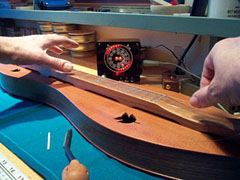Strings are taken very seriously at Bear Meadow. We are constantly on the watch for new developments in string technology, and look for the best sources for our music wire strings.
We use only the finest music wire from Mapes Piano String Co. for our plain strings, which we form ourselves with a simple looping tool. For the wound strings, we use three manufacturers: DR Strings (handmade guitar strings), GHS Strings (who furnish an unusual array of choices in tonal quality) and D'Addario. Choosing strings is an important aspect of designing the instrument. Several factors influence this decision.
Here is an accurate way to determine the tension of specified plain and wound strings, at a given scale length and pitch. There are also very accurate tables of various possible string sets used at Bear Meadow. You can enter your own string diameters, scale length, and pitches. There is even a place, on the "Tension Calculator" sheet, to measure and enter the size of your wound strings' diameters and core diameters to derive a "k factor" or effective mass factor for them.
We have made extensive (but not complete) experimental measurements to calculate string tension at various pitches found in dulcimer tunings. A complete table of the measurements and a graph can be found here.
You can use this information to help choose string sizes for your own instrument, using the directions found in the "Findings on the Tension vs Pitch Data."
And, lastly, here is a table of the various string setups commonly used in Bear Meadow Appalachian dulcimers:

